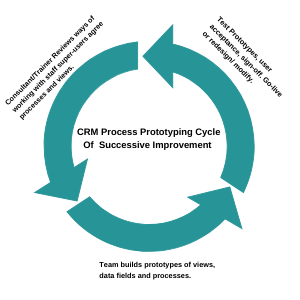Our Services

Consultancy
Our CRM consultants are drawing on many years of management and organisational effectiveness experience much broader than Sales or CRM systems. We work with management teams seeking to implement more effective ways of working. Our experience spans many organisation types, cultures and business areas as well as in-depth experience in not-for-profit orgnaisations, education and charity work. For organisations looking at a CRM investment there are areas of the ‘CRM Journey’ support that are not about a particular CRM product or how it works; consultancy is helpful with the areas of:
- Change Management
- CRM Readiness
- Cultural evolution
- Management training
- CRM Strategy
- CRM Leadership

Implementation
With CRM, as with many other change-inducing projects, recognising the needs of the people whose ways of working will evolve is vital. Our projects follow best practice specifically addressing the working culture and user buy-in. The implementation phase begins with a seminar/workshop which introduces the senior management leadership agenda and guidance on the corporate context for the CRM. JI Consultants advise on the process of staff acceptance and involvement in the corporate benefit proposition.
- IT Infrastructure and resource
- Understanding CRM and relationship imperatives
- Commissioning and testing
- Rollout

Training
We Offer a complete range of training options tailored to customer requirements. Standard Training requirements typically include:
- Basic user interface training,
- Installation engineer training
- Advanced user interface
- Super user
- Application Administrator
- Train the trainer- Basic user interface
- Train the trainer- Application rollout workshop
- Data injection configuration
Operational Application Live
- Effectiveness review workshop leader
- Protocol document origination and maintenance
- Data Build and maintenance of of user-defined fields
- Admin Process design and build

CRM Journey
- Understand the enterprise
- Understand the customer
- Understand relationship jobs
WHat DOES CRM MEan in 2020 and beyond?
Fitting the CRM solution to the established ways of working in the team is key. The traditional customisation sequence of Business Process Analysts creating the specification followed by software development and user testing, has frequently not worked well. Perhaps the centralisation of design is taking process ownership away from users? Could this be what has weakened user buy-in and commitment to success?
User-customisable CRM works differently. Implementation of No-Code/Low-code CRM designs employs a rapid-development prototyping cycle where processes are validated in real time.
User-customisable CRM

Locating process ownership within each relationship team secures user buy-in, and exploits the no-code/low-code CRM technology of user-customisable CRM’s. A process-prototyping approach uses a design sequence as at left. This is a low-cost, high flexibility approach.
In contrast, large, ‘one-size-fits-all’ CRM designs today still employ variations of the programmed-process CRM design pioneered by Siebel CRM over 20 years ago. Programmed-process CRM products were designed for ‘top-down’ deployment to hundreds or even thousands of staff working in a process-driven way. Call-centres are typical examples. The central CRM implementation team with business process specialists were seen as being best-qualified to design CRM customisations, but the lack of flexibility in turbulent times can be a problem. The central team also suffers from a remoteness that leaves users feeling misunderstood. They typically claim that the CRM processes have not been designed for working quickly under pressure or ease-of-use.
Low-code CRM designs offer flexibility and agility that a central software development resource is not structured to address. Users and some IT people report a disappointment that the reality for relationship staff is not what was expected when the heavyweight CRM was selected. The CRM experience that was delivered is not helping them to do their jobs better. Perhaps the strategy of choosing a single CRM platform for every relationship/service type and every stakeholder-facing department is obsolete. JI Group has chosen to specialise in user-customisable solutions. Give us a call and tell us what you want from CRM.
No-code/Low-code CRM Designs
So, what does a move to No-Code/Low-code CRM really mean? The significantly lower resource demand may enable central budget savings. If the inefficiency and time-wasting complaint holds true, staffing pressure may be reduced. For relationship work, the more human scale user experience encourages buy-in and better customer service.
Relationship management teams that are self-sufficient in CRM find that staff readily use the system because it helps them to do their jobs better. When the user team is also empowered to think about and create better ways of improving relationship quality, there is scope to implement a continuous process improvement programme. This supports the payback from developing a ‘learning’ culture and ‘Agile’ ways of working. Today’s organisations are moving towards a 21st Century culture supporting process ownership inside the team.
There may be cases where a central ‘backbone’ CRM design is needed, while some departments need a user-customisable solution. When more than one CRM system is to be deployed, new data architecture strategies will be needed. JI Group has tried and tested data integration solutions.

CASE STUDIES

Management Need Data They Can Trust

Simpler CRM Interfaces Can Deliver Bigger Benefits





